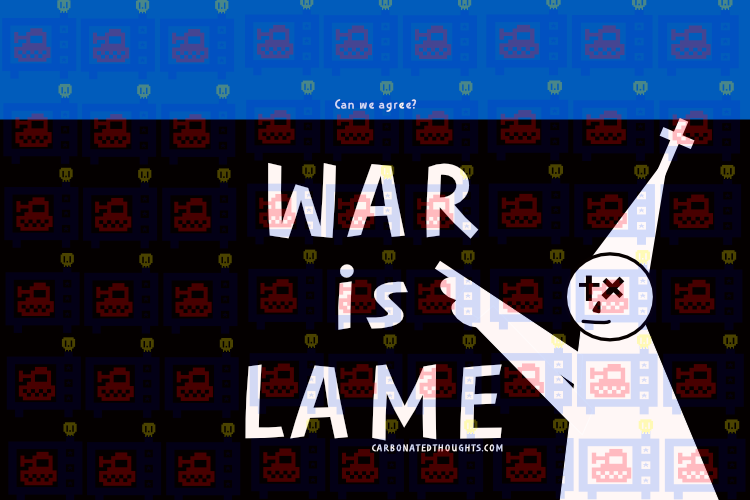Collection: WAR IS LAME
Human society often chooses to fight rather than getting along due to a combination of factors, including competition for limited resources, differences in ideologies and beliefs, power struggles, fear, and a history of conflicts. These factors can lead to disputes and confrontations, making conflict a common choice in human history.
War can benefit very few individuals or groups in several ways:
-
Economic Gains: Arms manufacturers, defense contractors, and certain industries can profit significantly during times of war. These companies often secure lucrative government contracts for weapons, equipment, and infrastructure, leading to increased wealth for their owners and shareholders.
-
Political Power: Leaders and governments can consolidate power during wartime, as national security concerns may lead to increased authority and control. Emergency measures can be used to centralize power, and leaders can rally public support during times of conflict.
-
Resource Acquisition: Wars can be driven by the desire to gain control of valuable resources such as oil, minerals, or fertile land. Those in control of these resources can benefit economically and politically.
-
Territorial Expansion: Conquest in war can lead to the expansion of a nation's territory, increasing its influence and potentially providing new opportunities for the ruling class.
-
Ideological or Religious Agendas: Sometimes, wars are fought to promote specific ideologies or religious beliefs. Those who share these beliefs may see war as a means to establish dominance or further their agendas.
It's important to note that while these benefits may accrue to a select few, the vast majority of people often suffer during wars due to loss of life, displacement, economic hardship, and social disruption. War has widespread negative consequences, and its benefits for a small elite should not be taken as a justification for the immense human suffering it causes.

-
Why Must We Fight 9" White Skateboard
Regular price From $74.99 USDRegular priceUnit price / per -
Why Must We Fight 9" Natural Wood Skateboard
Regular price From $74.99 USDRegular priceUnit price / per -
Pope Of Love Fuck Putin, Short-sleeve unisex t-shirt
Regular price From $18.00 USDRegular priceUnit price / per




